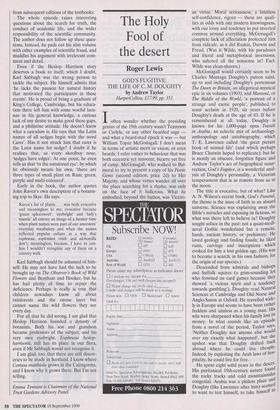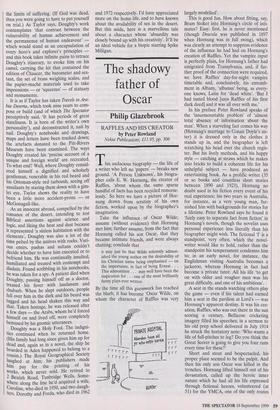The Holy Fool of the desert
Roger Lewis
GOD'S FUGITIVE: THE LIFE OF C. M. DOUGHTY by Andrew Taylor HarperCollins, £17.99, pp. 351 Ioften wonder whether the presiding genius of the 19th century wasn't Tennyson or Carlyle, or any other bearded sage and what a beard-mad epoch it was — but William Topaz McGonagall. I don't mean in terms of artistic merit or vision, or even beards; I refer rather to behaviour that was both eccentric yet innocent, bizarre yet free of camp. McGonagall, who walked to Bal- moral to try to present a copy of his Poetic Gems (second edition, price 2d) to Her Majesty, and whose verses wander all over the place searching for a rhyme, was only on the face of it ludicrous. What he embodied, beyond the bathos, was Victori- an virtue. Moral seriousness, a limitless self-confidence, vigour — these are quali- ties at odds with our modern knowingness, with our irony and tendency to put inverted commas around everything. McGonagall's complete lack of affectation protected him from ridicule, as it did Ruskin, Darwin and Freud. (Was it Wilde, with his paradoxes and literal and metaphorical inversions, who ushered all the nonsense in? Fact: Wilde was clean-shaven.) McGonagall would certainly seem to be Charles Montagu Doughty's patron saint, up to and including Doughty's portentous The Dawn in Britain, an allegorical-mystical epic in six volumes (1903), and Mansoul, or The Riddle of the World, 'a portrait of a strange and exotic people', published to scant acclaim in 1920, six years before Doughty's death at the age of 83. If he is remembered at all today, Doughty is known for his 1,000-page opus Travels in Arabia, an eclectic mix of archaeology, anthropology and autobiography, which T. E. Lawrence called 'the great picture book of nomad life' (and which perhaps Bruce Chatwin hoped to replicate); but he is mostly an obscure, forgotten figure and Andrew Taylor's act of biographical resur- rection, God's Fugitive, is a wonderful anal- ysis of Doughty's personality, a Victorian temperament that is as remote from us as the moon.
The title is evocative, but of what? Like A. N. Wilson's recent book, God's Funeral, the theme is the issue of faith in an absurd universe. Science was explaining away the Bible's miracles and exposing its fictions, so what was there left to believe in? Doughty sought solace in the past: not a quasi-medi- aeval Gothic wonderland but a remote, harsh, ancient history, or prehistory. He loved geology and finding fossils; he liked ruins, carvings and inscriptions which evoked for him a lost golden age. (His was to become a search, in his own fashion, for the origin of our species.) Descended from admirals and bishops and Suffolk squires (a grim-sounding lot who frowned on card games because they showed 'a vicious spirit and a tendency towards gambling'), Doughty read Natural Sciences at Cambridge and Old Norse and Anglo-Saxon at Oxford. He travelled wide- ly in Europe and seems to have been rather feckless and aimless as a young man. wits were sharpened when his family lost its money. In what sounds like an episode from a novel of the period, Taylor says, `Neither Doughty nor anyone else would ever say exactly what happened', but the upshot was that Doughty drifted back abroad where he could live cheaply. Indeed, by exploiting the Arab laws of hos- pitality, he could live for free. He spent eight solid years in the desert. His puritanical 19th-century nature found the rocky tracks and cold mountainsides, congenial. Arabia was a pitiless place allat, Doughty (like Lawrence after him) seemed to want to test himself, to take himself to the limits of suffering. (If God was dead, then you were going to have to put yourself on trial.) As Taylor says, Doughty's work contemplates 'that contrast between the vulnerability of human achievement and the permanence of human endeavour' which would stand as an encapsulation of every hero's and explorer's principles and this book takes infinite pains to retrace Doughty's itinerary, to evoke him on his camel, carrying the kit that contained the edition of Chaucer, the barometer and sex- tant, the set of brass weighing scales, and the papier-mache materials used to take impressions — or 'squeezes' — of statuary and monuments.
It is as if Taylor has taken Travels in Ara- bia Deserta, which took nine years to com- pose or build (and of which The Spectator perceptively said, 'It has periods of great stateliness. It is born of the writer's own personality'), and deconstructed it, nail by nail. Doughty's notebooks and drawings, maps and letters have been tracked down; the artefacts donated to the Pitt-Rivers Museum have been examined. The ways Doughty created his 'precise account of a unique and foreign world' are recreated. To what end? Well, where Doughty consid- ered himself a dignified and scholarly gentleman, venerable in his red beard and his Ottoman-style red tarboosh, seeing off assailants by staring them down with a gim- let eye, Taylor shows the reality to have been a little more accident-prone — or McGonagall-like. As an innocent abroad, compelled by the romance of the desert, intending to test Biblical assertions against science and logic, and liking the heat and dust because it represented 'a sinless habitation with the elements', Doughty was also a lot of the time pelted by the natives with rocks. Vari- ous emirs, pashas and sultans couldn't decide whether to have him executed or to befriend him. He was continually insulted, humiliated and treated with contempt and disdain. Found scribbling in his notebooks, he was taken for a spy. A patient died when Doughty, passing himself off as a doctor, treated his fever with laudanum and rhubarb. When he slept outdoors, people fell over him in the dark and his beard was tugged and his head shaken this way and that. Taken hostage, he was released after a few days — the Arabs, whom he'd forced himself on and lived off, were completely bemused by his gnomic utterances. Doughty was a Holy Fool. The indigni- ties continued when he returned home. (His family had long since given him up for dead and, again as in a novel, the ship he boarded in Aden happened to belong to a cousin.) The Royal Geographical Society laughed at him; his publishers made him pay for the printing of his works, which never sold. He retired to 2 Beulah Road, Tunbridge Wells. Some- where along the line he'd acquired a wife, Caroline, who died in 1950, and two daugh- ters, Dorothy and Freda, who died in 1962 and 1972 respectively. I'd have appreciated more on the home life, and to have known about the availability of sex in the desert. But this aside, here is a marvellous tale about a character whose 'absurdity was closely bound up with his creativity'. It'll be an ideal vehicle for a biopic starring Spike Milligan.



























































































 Previous page
Previous page